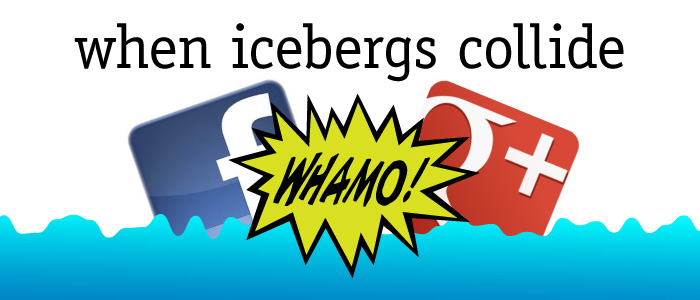
Search Engine Marketing After Google+ Shuts Down
March, 2014 | by John Siebenthaler
UPDATE 2019 — There have been countless changes in both Facebook and Google+ since this article was first published. Facebook continues to upgrade their user interface while adding capabilities like live video. Sound familiar?
Google, on the other hand, hit the brakes, cancelling Google+ in 2019 and rearranging their other asset related channels.
As a result, Facebook’s much friendlier access now makes brand pages more visible, while at the same time severely limiting their feed visibility.
Then there’s Small Business, or Google My Business. Google dominates local search if you’re talking about business location, and there is a direct connection between Google+ and Google My Business pages, which is particularly good news, especially for Brand pages. Google search first displays My Business pages as well as web sites, news, and other related information that can include Google+.
Searching within Facebook for a business or service only displays Facebook brand pages, an outcome that by design will miss a lot of references. The question remains: is there an advantage to supporting both platforms? The answer remains, yes.
When Google Confronted Facebook
When Google launched their + (Plus) project in 2011 it wasn’t immediately clear exactly what the new “product” would deliver in terms of benefit. In many ways the confusion continues, but Search Engine Marketing strategy is a major beneficiary of the social channel introduction.
Google+ is the numerically less popular but graphically superior alternative to Facebook’s walled off city of social citizens. That community is populated by a billion or so of the planet’s online activists who get their news from each other and from their interest page likes. Google+ ranks second, ahead of Twitter and LinkedIn, but depending on how well built out your overall Google presence is – YouTube springs to mind – the sum could be more than the whole.
So what we have is a case of dual citizenship. It’s hard to ignore Facebook’s easy popularity, but it’s self-defeating to shrug off Google+ simply as an also-ran.
Last December Facebook flipped the switch on a new News Feed algorithm. That update immediately changed the landscape for brands that have invested heavily into building their publicly visible pages of focusing marketing strategy around generating page likes.
Overnight, appearance on a fan’s news feed – i.e., why a brand is on Facebook – went from possible or probable to not likely. In other words, my liking your page and its contents likely has nothing to do with whether or not I see your posts.
This video by Veritasium describes how FB page “likes” are artifically inflated.
This wasn’t totally unexpected. If a business wants to improve their reach, the answer now can be found in putting up some cash. In the future riders need to pay to board as the free trolly to popularity has run its course so far as fan feed visibility is concerned.
Not All Searches Are Equal
Google, for its part, continues to refine Plus. The recent reformating of a page’s cover from a massive attention-grabbing panorama to a more manageable 960 pixel width made good sense. But while Facebook continues to garner most of the social channel press, what’s the case – if any – to be made for Plus? Turns out, plenty.
The most obvious advantage is how Google’s multitude of products, from Picasa* to YouTube and Blogger to Gmail, are intertwined. At its heart Google is search. While Search Engine Marketing (SEM) isn’t confined to one player, in practical terms that 800-pound gorilla is Google. And that’s where Plusers stand to get an immediate boost.
Lets say you search Google for “seafood restaurant” expecting a waterfall of eateries to cascade around your shoulders. Because I live on Florida’s Gulf Coast I see a broad selection. But while nearly all have a Facebook presence, unless I specify “Facebook” in the search string, it’s a cold search for a warm dinner.
Searching for the same string in Facebook and hoping to find a page is a multi-step challenge at navigating the Byzantine maze of prompts and deadends. True, searching inside Google+ also limits the results initially, but that’s not how most search.
If you’ve set up a Google+ business page along with your Google Places listing, you’re in luck. Not only are you highlighted on a local map, you’ll also have your web site (if any) and your +page shown as well.
Creating Visual Content A Winning Strategy
What about photos and video? More media equals more attention. All that rich content uploaded to Facebook remains, for the most part, invisible to Google. You could search using Facebook’s default Bing but since less than 2% of visitors to my site find their way there using Microsoft’s search engine versus 97% who Googled me, I’d say it’s a dead end strategy.
Google, however, loves media, especially when properly tagged. You’ll get plenty of juice there, as well as from Yahoo’s recently transformed Flickr property.
With everyone constantly hounded to optimize this channel or that, to Tweet, post, upload and share every waking minute of a 25-hour day, there’s literally no limit to the potential number of contact points waiting to be set up online.
The reality is, it’s humanly impossible to properly service a small handful at any one time, and even then it’s a major investment in time, talent and energy.
One Or The Other? Plan On Both
At this point, Google seems content to pursue a strategy of patience regarding their Plus property, even as Facebook becomes a more demanding taskmaster. It may be that, when viewed from the context of outbound versus inbound marketing, a Google oriented game plan might be much more productive in the long run than the internally driven Facebook approach.
Of the two channels, you may potentially reach more fans on Facebook (outbound) but you may attract more fans as a whole (inbound) by optimizing a solidly constructed Google approach to both search and product.
So what we have is a case of dual citizenship. It’s hard to ignore Facebook’s easy popularity, but it’s self-defeating to shrug off Google+ as an also-ran.
*People that don't use Google+ aren't left out. They'll get an email to view your album in Google+, and they don't have to join to do so.





